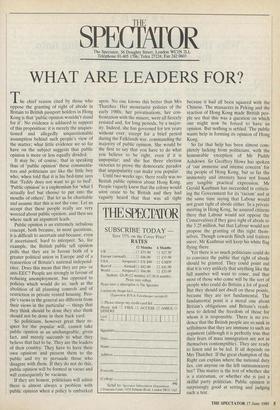SPECTAT r " OR
The Spectator, 56 Doughty Street, London WC1N 2LL Telephone 01-405 1706; Telex 27124; Fax 242 0603
WHAT ARE LEADERS FOR?
The chief reason cited by those who oppose the granting of right of abode in Britain to British passport holders in Hong Kong is that 'public opinion wouldn't stand for it'. No evidence is adduced in support of this proposition: it is merely the unques- tioned and allegedly unquestionable assumption behind such people's view of the matter; what little evidence we so far have on the subject suggests that public opinion is more or less equally divided.
It may be, of course, that in speaking thus of 'public opinion' these commenta- tors and politicians are like the little boy who, when told that it is his bed-time says that 'Teddy does not want to go to bed'. `Public opinion' is a euphemism for 'what I actually feel but choose to put into the mouths of others'. But let us be charitable and assume that this is not the case. Let us accept that these people really are very worried about public opinion, and then see where such an argument leads.
Public opinion is an extremely nebulous concept, both because, in most questions, it is difficult to ascertain and because, even if ascertained, hard to interpret. So, for example, the British public tell opinion polls that they are in favour both of a greater political union in Europe and of a reassertion of Britain's national independ- ence. Does this mean that they are pro- or anti-EEC? People are strongly in favour of reducing unemployment, but opposed to policies which would do so, such as the abolition of all planning controls and of restriction in private rented housing. Peo- ple's views in the general are different from their views in the particular — things that they think should be done they also think should not be done in their back yard.
So politicians, however great their re- spect for the popular will, cannot take public opinion as an unchangeable, given fact, and merely succumb to what they believe that fact to be. They are the leaders of their country. They have to have their own opinions and present them to the public and try to persuade those who disagree with them. If they do not do this, public opinion will be formed in vacuo and will consequently be vacuous.
If they are honest, politicians will admit there is almost always a problem with public opinion when a policy is embarked upon. No one knows this better than Mrs Thatcher. Her monetarist policies of the early 1980s, her privatisations, her con- frontation with the miners, were all fiercely resisted and, for long periods, by a major- ity. Indeed, she has governed for ten years without ever, except for a brief period during the Falklands war, commanding the majority of public opinion. She would be the first to say that you have to do what you believe to be right, even if it is unpopular; and she has three election victories to prove the democratic paradox that unpopularity can make you popular. Until two weeks ago, there really was no British public opinion about Hong Kong. People vaguely knew that the colony would soon cease to be British and they had vaguely heard that that was all righ because it had all been squared with the Chinese. The massacres in Peking and the reaction of Hong Kong made British peo- ple see that this was a question on which one might now be forced to have an opinion. But nothing is settled. The public wants help in forming its opinion of Hong Kong.
So far that help has been almost com- pletely lacking from politicians, with the honourable exception of Mr Paddy Ashdown. Sir Geoffrey Howe has spoken of 'our immense and intense concern' for the people of Hong Kong, but so far the immensity and intensity have not found any tangible practical expression. Mr Gerald Kaufman has succeeded in criticis- ing the Government for its 'racism' and at the same time saying that Labour would not grant right of abode either. In a private meeting in Hong Kong, he assured citizens there that Labour would not oppose the Conservatives if they gave right of abode to the 3.25 million, but that Labour would not propose the granting of this right them- selves. Though cowards flinch and traitors sneer, Mr Kaufman will keep his white flag flying there.
Yet there is so much politicians could do to convince the public that right of abode should be granted. They could point out that it is very unlikely that anything like the full number will want to come, and that most of those who come will be the sort of people who could do Britain a lot of good. But they should not dwell on these points, because they are not fundamental. The fundamental point is a moral one about Britain's obligations and Britain's readi- ness to defend the freedom of those for whom it is responsible. There is no evi- dence that the British people are so sunk in selfishness that they are immune to such an argument (although it is perfectly true that their fears of mass immigration are not in themselves contemptible). They are ready to listen and to be led. It all depends on Mrs Thatcher. If the great champion of the Right can explain where the national duty lies, can anyone on the left outmanoeuvre her? This matter is the test of whether she is a statesman, or whether she is' just a skilful party politician. Public opinion is surprisingly good at setting and judging such a test.


















































 Previous page
Previous page